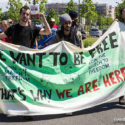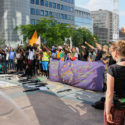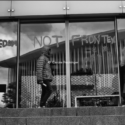Search results for: “Luxemburg”
-
Sudan Revolution Interview
T: We already know you from the Oranienplatz resistance but can you introduce yourself a bit? A: Adam Bahar. I am coming from Sudan. I’m born in Sudan but I’m in Germany since 2012. Politically active in Sudan since 2002. I was in university fighting for the right of the people of Sudan and against…
-
28.09. 10 Jahre – Das muss gefeiert werden! // 28/09 10 ans – ça se fête! // Sept. 28th 10 years have to be celebrated!
– francais en bas – english below – 10 Jahre – Das muss gefeiert werden! Im Jahr 2009 haben wir unseren unerbittlichen Kampf gegen Rassismus und andere Formen der Diskriminierung begonnen. Wir haben gegen das Gutschein-System, die neuen Asylgesetze, Abschiebungen, die Residenzpflicht, die Schikanen der Ausländerbehörde, und vieles mehr gekämpft.Wir haben auch Flüchtlinge und Aktivisten…
-
Still marching for freedom – Ein Gespräch mit Aktivist*innen
von No Border Frankfurt “Still marching for freedom” – Transnationaler Kampf für globale Bewegungsfreiheit und gegen Repression Wann: Samstag, 24. Februar 18:30 – 20:30 Uhr Wo: Klapperfeld Ex-Gefängnis, Klapperfeldstraße 5, 60313 Frankfurt am Main Im Jahr 2014 organisierten verschiedene Gruppen aus der refugee-Bewegung den march for freedom von Straßburg nach Brüssel. Damit wurde der Kampf…
-
Soli Crêpes against repressioncrap!
for the 24.10: https://www.facebook.com/events/1186910981441970 for the 28.11: https://www.facebook.com/events/1492764560817537 (with english version down below) Soli Crêpes against repressioncrap! Am 05.10 (Do), 24.10 (Di) und am 28.11 (Di) gibt es ab 19:30 Vegane Crêpes in der B-Lage. Bei einer gemeinsamen Aktion werden manchmal nur einige verurteilt. Was nicht heissen muss, dass sie es alleine durchstehen müssen. Kommt…
-
03.08. Soli Crêpes against repressioncrap!
Vegan Crêpes against repressioncrap Wann: Donnerstag, 03.08.2017 ab 19:30 Uhr Wo: B-Lage, Mareschstraße 1, 12055 Berlin (S Sonnenallee) Bei einer gemeinsamen Aktion werden manchmal nur einige verurteilt. Was nicht heissen muss, dass sie es alleine durchstehen müssen. 2014 während des March for Freedom in Luxemburg, gab es 13 brutale Festnahmen. Die Gefangenen wurden am…
-
Wegweisendes Urteil gegen den Einsatz für das Grundrecht auf Asyl – Haftstrafen für vier DemonstrationsteilnehmerInnen des March for Freedom
English Einladung zur Pressekonferenz, Montag 22.05.17, 11:00, Waldemarstr. 46 10999 Berlin 3 Jahre nach dem international organisierten March for Freedom wurden vier TeilnehmerInnen einer friedlichen Demonstration in Luxembourg-Stadt zu hohen Geld- und Bewährungsstrafen verurteilt. Der Verlauf des Prozesses und das Gerichtsurteil erscheinen bei nüchterner Betrachtung äußerst willkürlich und keinen rechtsstaatlichen Maßstäben entsprechend. Der March…
-
Roma zurück auf den Balkan? Sicheres Herkunftsland – wie sicher ist sicher?
Podiumsdiskussion „Roma zurück auf den Balkan? Sicheres Herkunftsland – wie sicher ist sicher?“ am Mittwoch, 19. April 2017 um 18:00 Uhr im Münzenbergsaal des neuen deutschlands, Franz-Mehring-Platz 1, 10243 Berlin. In Serbien bestreiten viele Roma ihr Leben in illegalen Siedlungen, ohne Zugang zum Gesundheits- oder Bildungssystem. Dennoch werden Menschen, die dieser Minderheit angehören, massenhaft aus…
-

Bericht der erster Prozesstag in #luxTrial gegen 6 Aktivist*innen des March for Freedom
english version further down! Wir sind angeklagt als Aktivist*innen des March for Freedom. Heute war in Luxemburg unser erster Prozesstag. Sechs Aktivist*innen waren vorgeladen, vier von uns sind vor Gericht erschienen. 30 Untersützer*innen war vor Ort. Vielen Dank für die Solidarität und Unterstützung in unterschiedlicher Weise aus und in Hamburg, Saarbrücken, Trier, Berlin, Marseille, Luxemburg…
-

March for Freedom accused of armed rebellion in Luxembourg
Struggles are continuously taking place everywhere, people are fighting for their rights all over the globe, but our memory has an overflow of information, it tends to archive past struggles and move to the next. But we are also aware that all our struggles are connected, rights are being removed everywhere, capitalism is a predator,…
-

# WeRadio! show with activists who are on trial after the March for Freedom 2014
Two and a half years after the internationally organized March for Freedom, six activists are going to trial. During the day of action on May 5, 2014 there were thirteen brutal arrests at a demonstration on the Kirchberg in Luxemburg. 2 1/2 Jahre nach dem international organisierten March for Freedom sind 6 AktvistInnen in Luxembourg-Stadt…